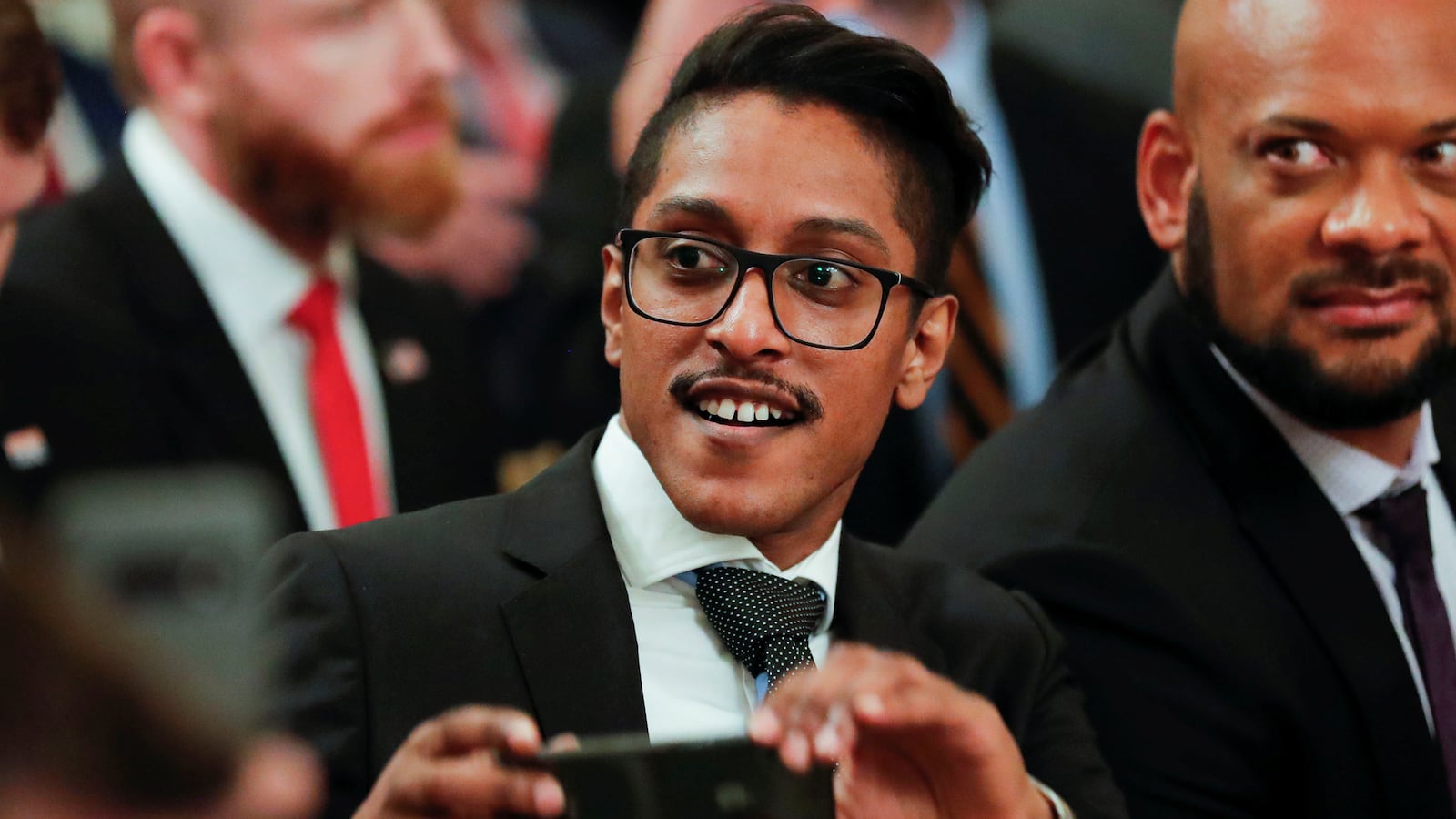One week after congressional investigators subpoenaed Jan. 6 organizer Ali Alexander, a dormant super PAC sent thousands of dollars to his old consulting firm.
The payout, earmarked for the admirably vague “PAC management services,” came Oct. 16 from “Stop The Steal PAC.” At $6,000, the payment accounted for more than half the money the group raised ahead of the riot, and Alexander’s firm, Vice and Victory, was one of only two vendors.
Interestingly enough, the campaign’s only other vendor was “A Political Firm, LLC,” the company belonging to the super PAC’s treasurer, a full-time compliance consultant named Patrick Krason. Krason denounced the Jan. 6 riot and emphasized to The Daily Beast that his role with the PAC, as with his other clients, didn’t go beyond filing paperwork.
That task, however, appears to have been difficult. And the confusion may impact the Jan. 6 investigation, because while the subpoena specifically requested information about Alexander’s “Stop the Steal” group, it might not have asked for the right information—or at least not all of the right information.
The confusion wasn’t because the PAC had too many donors. “Stop the Steal” received just one contribution, for $11,000, on the last day of 2020. The money, however, came from a donor whose name, address, occupation, and employer are all listed as “unknown.”
This was a problem. Federal election law requires committees to disclose that donor information, or at least make “best efforts” to do so. In this case, however, it seems Alexander—a longtime small-time GOP operative, conspiracy theorist, and key architect of Jan. 6—made that impossible.
In a note attached to the filing, the PAC’s treasurer explained that payment processors cut off access after Jan. 6, when Alexander’s “Stop the Steal” rally flowed directly into an attack on the U.S. Capitol. By that time, news reports had pulled the formerly fringe political personality front and center, broadcasting his name and image as one of the most influential figures behind the rallies. Not that he needed much help; by then Alexander, whose biggest claim to fame had until then been scoring a retweet from Don Jr., had made his role clear himself.
As a result of that attention, however, he became a target of investigators and went on the lam. And that’s when payment platforms blocked the PAC, leaving Krason in the lurch.
His note told the Federal Election Commission that the platforms had chosen to “unilaterally and without notice cancel the processing agreement and cut off all access to their platforms after the events of January 6… in Washington DC and refusing to work with the PAC to meet its compliance obligations.”
The “PAC team” was endeavoring to get the donor information from the payment processors, he wrote, adding that the group would file an amended report as soon as the information came in.
And while it’s possible that this information will all come out in the Jan. 6 committee’s subpoena, it might not. That’s because the PAC might not even be on their radar.
It may be somewhat surprising to see that the “Stop the Steal PAC” received almost no money, despite the movement’s popularity, the fervor of its adherents, and the success of other fundraising efforts for the same cause. The tens of millions of dollars that Donald Trump’s campaign apparatus sucked in at the same time provide the most notable contrast, as the groups were trading on the same lies to the same general audience.
But at the time of the PAC’s launch, the “Stop the Steal” organization was described as “a collection of disgraced right-wing internet figures.” And while Alexander’s name now pops up in mainstream press and network news, in the run-up to the riot, he largely operated in the margins.
Furthermore, Alexander’s name has never been linked to the PAC in official documents. His friend Daniel Bostic—an aspiring model and actor who Alexander once helped promote with a number of fake Bostic “celebrity” fan websites and Twitter accounts—was on the original organizational filings, however. And website data shows that the “Stop the Steal PAC” site belongs to Alexander’s company, Vice and Victory.
But Alexander took steps after the riot to cover those digital tracks, scrambling domains for numerous websites he owned.
Bostic’s name disappeared from the PAC’s registration documents shortly after it appeared in reports. And Alexander also changed the terms of service on the “Stop the Steal” website—a site he once described as “the home of the rebellion against an illegitimate government.”
The moves appear to have created conflicts with federal campaign finance law, raising questions of what kind of entity “Stop the Steal” was. This would determine which federal agency has regulatory power over the group, as well as which information is covered by the congressional subpoena.
The subpoena from the Jan. 6 Committee reflects this confusion.
In a letter to Alexander, the panel claimed that “Stop the Steal” is an LLC, pointing to Alexander’s own words in the website’s terms of service. The panel subsequently asked Alexander to provide documentation related to that LLC. The letter, however, never mentions the PAC.
According to the terms of service page today, the last modification happened on Dec. 30, 2020—a week before the riot. However, an earlier version of the terms of service, archived a few weeks after the riot, does not include that LLC language. This means the terms were in fact changed after Dec. 30, 2020, and that the site’s current claim otherwise is inaccurate. (The archived page also says it was last modified on Dec. 30, 2020.)
Instead, the terms of service indicate that “Stop the Steal” had been acting as a PAC up until the riot, then tried to pivot to a Limited Liability Corporation later. For instance, the website made a major change to its donations portal after the riot, adding links to two of Alexander’s personal cryptocurrency wallets, which were not on previous versions of that page. That money would go straight to Alexander, not the PAC account as it would have previously.
Finally, all available versions of the site’s terms, both current and archived, disclaim that donations to the group are political in nature, and subject to federal election law. But Krason may find that relevant passage maddening.
“Federal law requires us to use our best efforts to collect and report the name, mailing address, occupation, and name of employer of individuals whose contributions aggregate in excess of $200 per election cycle,” the page reads.








